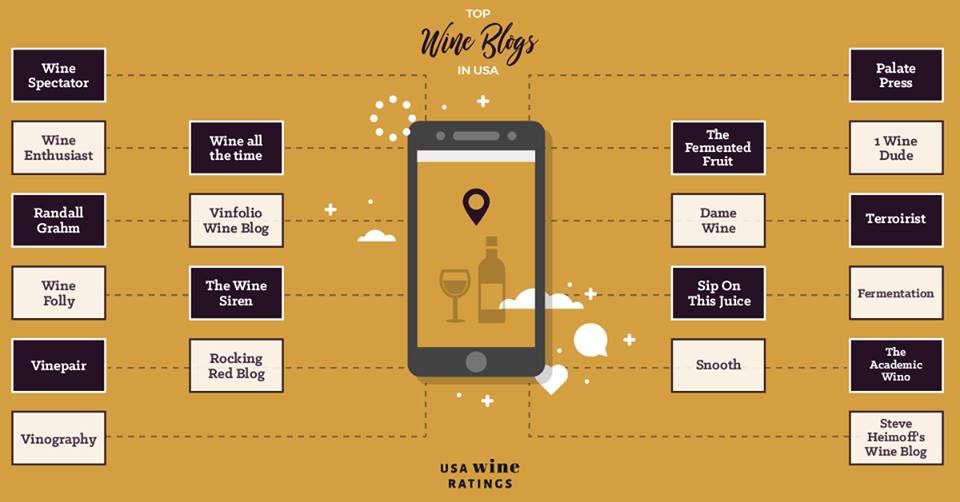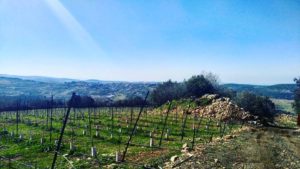 There are some vineyard visits that stand out in my mind. I can close my eyes and still feel the cool winter breeze on my face as I was standing in a newly planted plot that would eventually become biodynamic vines. The piles of beige stones that varied from small to humongous with patches of green growth here and there all painted an exotically wild vision. At one point, standing quietly near the edge of a cliff tempering my fear of heights, I looked out onto the valley that was at least 1480 feet (450 meters) below and saw lots of wildlife and sections of various flora amongst the rocky ranges. In the distance, on the left, was Lebanon… and as I turned my head to the right I could see Syria. It was stunning in its raw beauty.
There are some vineyard visits that stand out in my mind. I can close my eyes and still feel the cool winter breeze on my face as I was standing in a newly planted plot that would eventually become biodynamic vines. The piles of beige stones that varied from small to humongous with patches of green growth here and there all painted an exotically wild vision. At one point, standing quietly near the edge of a cliff tempering my fear of heights, I looked out onto the valley that was at least 1480 feet (450 meters) below and saw lots of wildlife and sections of various flora amongst the rocky ranges. In the distance, on the left, was Lebanon… and as I turned my head to the right I could see Syria. It was stunning in its raw beauty.
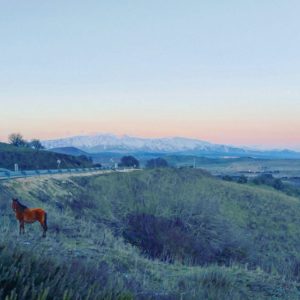 I was in northern Israel, in the Upper Galilee, visiting Recanati winery’s newest vineyard for their Carignan and Marawi (a Middle Eastern indigenous variety) that will each have their first vintage in 2019. It was such a peaceful place; various communities of Jews, Muslims and Christians were tucked away in clusters due to the rocky terrain. The Upper Galilee is a sort of Middle Eastern paradise with streams, waterfalls, and bursts of wildflowers and native plants such as prickly juniper and Lebanese cedar. After spending the week hearing many Israeli wine producers apologize to me that their landscape was not like Europe, I could not help thinking in that moment that they were doing themselves a disservice by doing so… Israel has a wealth of beauty, richness and diversity that is unique to their part of the world; it is a compelling place that interweaves a variety of cultures and landscapes so seamlessly that one takes for granted that it is so much more than the headlines that dominate our internet based lives.
I was in northern Israel, in the Upper Galilee, visiting Recanati winery’s newest vineyard for their Carignan and Marawi (a Middle Eastern indigenous variety) that will each have their first vintage in 2019. It was such a peaceful place; various communities of Jews, Muslims and Christians were tucked away in clusters due to the rocky terrain. The Upper Galilee is a sort of Middle Eastern paradise with streams, waterfalls, and bursts of wildflowers and native plants such as prickly juniper and Lebanese cedar. After spending the week hearing many Israeli wine producers apologize to me that their landscape was not like Europe, I could not help thinking in that moment that they were doing themselves a disservice by doing so… Israel has a wealth of beauty, richness and diversity that is unique to their part of the world; it is a compelling place that interweaves a variety of cultures and landscapes so seamlessly that one takes for granted that it is so much more than the headlines that dominate our internet based lives.
Recanati Winery
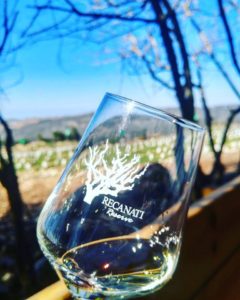 Recanati is an Israeli wine producer that has decided to spearhead the production of wines made from Mediterranean grape varieties such as Syrah and Carignan. In New York City, they are known as a top quality producer trying to challenge the (wrong) preconceptions of wines made in Israel. Instead of trying to deny what is innately special about their sense of place out of fear of rejection, they have decided that the only way they can show their world class wines is by highlighting the best of what naturally thrives in their area.
Recanati is an Israeli wine producer that has decided to spearhead the production of wines made from Mediterranean grape varieties such as Syrah and Carignan. In New York City, they are known as a top quality producer trying to challenge the (wrong) preconceptions of wines made in Israel. Instead of trying to deny what is innately special about their sense of place out of fear of rejection, they have decided that the only way they can show their world class wines is by highlighting the best of what naturally thrives in their area.
Recanati’s recent research into indigenous varieties has allowed them to discover Marawi, a white grape variety that was found growing on pergola (trellis canopy management) in a Palestinian vineyard, as well as Marawi’s “little brother” Bittuni – a red grape variety; both have been identified as having unique DNA at the University of Milan. There has already been tons of research finding unidentifiable, seemingly local grape varieties in the Middle East, but most of them do not seem to be ideal for winemaking purposes with the exception of a few, such as the Marawi and Bittuni which, ironically, were found growing in a country, Palestine, where making wine is outlawed in some areas (the production or sale of alcohol is not outlawed everywhere in Palestine).
Homeland of Arabic & Hebrew
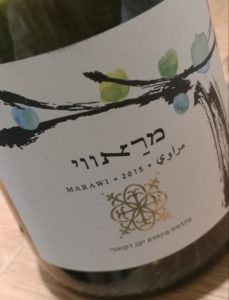 Recanati puts both the Arabic and Hebrew names for the Marawi and Bittuni on the labels in homage to the shared homeland of these grapes. Recanati has more recently planted their own Marawi in the vineyard where I was standing to take in the majestic view of the Upper Galilee. As much as they have enjoyed working with the Palestinian farmer who grows their Marawi, the vines were originally planted for growing grapes for eating, so Recanati decided that they needed to set up their own vineyard that will produce high quality vines for wine… also, since the farmer is afraid of possible retaliation from terrorist groups for selling wine grapes to an Israeli producer, it is unknown how long this farmer, who remains protected by anonymity, will be able to do business with Recanati.
Recanati puts both the Arabic and Hebrew names for the Marawi and Bittuni on the labels in homage to the shared homeland of these grapes. Recanati has more recently planted their own Marawi in the vineyard where I was standing to take in the majestic view of the Upper Galilee. As much as they have enjoyed working with the Palestinian farmer who grows their Marawi, the vines were originally planted for growing grapes for eating, so Recanati decided that they needed to set up their own vineyard that will produce high quality vines for wine… also, since the farmer is afraid of possible retaliation from terrorist groups for selling wine grapes to an Israeli producer, it is unknown how long this farmer, who remains protected by anonymity, will be able to do business with Recanati.
Blocking Out the Chatter to Get to the Heart
Since I live in New York City, a city that has the largest population of Jewish people outside of Israel, Jewish culture is part of my life. I am a mixed mutt of various influences – some people might think that I would stand, politically speaking, against Palestinians – but they would be mistaken, having not realized that I have spent a lot of time with Palestinian people here in New York City. A few months after 9/11, I actually spent all day in a Muslim mosque during an event when many families from a Jewish temple came to support the Muslim families by forming relationships with them… and such gatherings are still prevalent in NYC. And so, except for a few extremists, people just want to be able to live in peace in a way that is meaningful to them and to give other people that right as well.
Unfortunately the world is a dangerous place, some areas more so than others, and precautions need to be taken… and although Muslim and Jewish people in the Middle East deal with each other in personal and business situations all the time, it is still complicated by the fact that a certain amount of vigilance for safety needs to be maintained. No one wants it this way but it is the reality that both try to navigate in their daily lives. I have to say it has been Israelis that have encouraged me the most to travel across the Middle East to other countries, Muslim countries, and to not be so afraid. Their love for that area of the world extends past their own borders.
I think the world is going through a transition where all of us want to be able to wave our various flags of pride, whether we are Israeli, Palestinian or an American mutt like myself, and not have a barrage of misnomers thrown our way. Just because we show pride in who we are and where we are from doesn’t mean we are against anywhere or anyone else. I am hopeful that these open hearted, indigenous wines of Recanati will remind us that although our political leaders are constantly engaged in ridiculous amounts of saber rattling, the people are constantly trying to find ways to connect. Trust me, there is much more beauty than ugliness in how people live in Israel… I saw it with my own eyes and felt it within my bones… but you have to block out all of the gossip, all the chatter, all the click bait titles from unscrupulous content creators… you need to open your heart to know the heart of this part of the world.
*********************************************************************
Tasting of Recanati wines on October 19th, 2017 as a lunch guest at Nur restaurant, in Manhattan, NYC, which specializes in modern Middle Eastern dishes
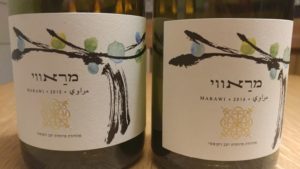 –2015 Marawi, Bethlehem, Judean Hills, West Bank, Palestine: 100% Marawi. The 2015 had more of a flinty minerality with hints of lanolin and restrained fruit than the 2016 – reminds me of a Savennières but with more approachable acidity.
–2015 Marawi, Bethlehem, Judean Hills, West Bank, Palestine: 100% Marawi. The 2015 had more of a flinty minerality with hints of lanolin and restrained fruit than the 2016 – reminds me of a Savennières but with more approachable acidity.
 –2016 Marawi, Bethlehem, Judean Hills, West Bank, Palestine: 100% Marawi. 2016 had more fruit, as Recanati is still experimenting with this variety and is finding the best way to work with it… white peach, Bartlett pear, honeysuckle and only a hint of crushed stones with more weight on the body. Very exciting white wine! Also, it was fun to have it with the Palestinian Tartare at Nur… the wine and dish originated in the same place.
–2016 Marawi, Bethlehem, Judean Hills, West Bank, Palestine: 100% Marawi. 2016 had more fruit, as Recanati is still experimenting with this variety and is finding the best way to work with it… white peach, Bartlett pear, honeysuckle and only a hint of crushed stones with more weight on the body. Very exciting white wine! Also, it was fun to have it with the Palestinian Tartare at Nur… the wine and dish originated in the same place.
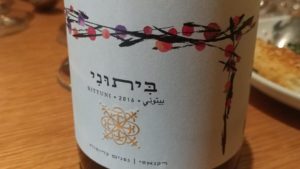 -2016 Bittuni, Bethlehem, Judean Hills, West Bank, Palestine:: 100% Bittuni – the little brother of Marawi that makes a red wine instead of a white one, an indigenous variety of the Middle East that could be most similar to Pinot Noir… with red berry delights (strawberry and raspberry), the soft texture of Pinot Noir, the spicy, peppery quality of Blaufränkisch and an interesting hint of wild, dried herbs. Nice to serve cooler than room temperature (about 10 minutes in the fridge) to truly appreciate the exotic delicacy of this red wine.
-2016 Bittuni, Bethlehem, Judean Hills, West Bank, Palestine:: 100% Bittuni – the little brother of Marawi that makes a red wine instead of a white one, an indigenous variety of the Middle East that could be most similar to Pinot Noir… with red berry delights (strawberry and raspberry), the soft texture of Pinot Noir, the spicy, peppery quality of Blaufränkisch and an interesting hint of wild, dried herbs. Nice to serve cooler than room temperature (about 10 minutes in the fridge) to truly appreciate the exotic delicacy of this red wine.
 -2014 Special Reserve White, Vineyards in Kidmat Reserve, Golan Heights, Israel: 60% Roussane and 40% Marsanne. This wine may not be for everyone, but for those who love a great white Châteauneuf-du-Pape, this will be your jam – as we like to say in the US. Juicy peach flavors, with floral and nutty notes. Rich texture as one would expect from these varieties, yet plenty of acidity to balance it – not flabby at all like lower quality versions of these varieties. I’m not usually a fan when there is too much Marsanne in a blend but this wine has changed my mind. Perhaps it just needed to be grown under the right conditions. Golan Heights is considered one of Israel’s highest quality wine regions, next to the Upper Galilee, in the overall encompassing wine region of Galilee. It is a cooler wine region compared to other areas in Israel that is known for its volcanic soils.
-2014 Special Reserve White, Vineyards in Kidmat Reserve, Golan Heights, Israel: 60% Roussane and 40% Marsanne. This wine may not be for everyone, but for those who love a great white Châteauneuf-du-Pape, this will be your jam – as we like to say in the US. Juicy peach flavors, with floral and nutty notes. Rich texture as one would expect from these varieties, yet plenty of acidity to balance it – not flabby at all like lower quality versions of these varieties. I’m not usually a fan when there is too much Marsanne in a blend but this wine has changed my mind. Perhaps it just needed to be grown under the right conditions. Golan Heights is considered one of Israel’s highest quality wine regions, next to the Upper Galilee, in the overall encompassing wine region of Galilee. It is a cooler wine region compared to other areas in Israel that is known for its volcanic soils.
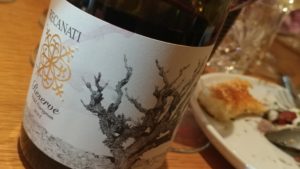 –2014 Reserve Wild Carignan Old Vines Dry-Farmed Single Vineyard, Judean Hills, Israel: 100% Carignan. Grapes from some of the oldest vines in Israel, grown in little gnarly bushes that produce intoxicatingly exotic aromas & flavors with savory animal notes and spicy black berries that give a savage edge while retaining fresh finesse.
–2014 Reserve Wild Carignan Old Vines Dry-Farmed Single Vineyard, Judean Hills, Israel: 100% Carignan. Grapes from some of the oldest vines in Israel, grown in little gnarly bushes that produce intoxicatingly exotic aromas & flavors with savory animal notes and spicy black berries that give a savage edge while retaining fresh finesse.
 -2014 Special Reserve, Red Blend, Vineyards in Kidmat Reserve, Golan Heights, Israel: An exotic show stopper with 30% Cabernet Sauvignon, 30% Syrah, 17% Petite Sirah, 13% Carignan and 10% Marselan. I have known about this wine for a long time since it has received plenty of critical acclaim here in New York City, and it was always considered the standard-bearer for Israeli fine wine. At one time, this wine had more Cabernet Sauvignon, and even though their intention was not to change that, they could not help but notice that the Mediterranean varieties were doing very well, and so, to reflect their best red blend, it has naturally through time become more Mediterranean dominant. Dark and delicious with blackberry preserves, silky tannins and black currant leaf and smoky tea that has an extraordinary length.
-2014 Special Reserve, Red Blend, Vineyards in Kidmat Reserve, Golan Heights, Israel: An exotic show stopper with 30% Cabernet Sauvignon, 30% Syrah, 17% Petite Sirah, 13% Carignan and 10% Marselan. I have known about this wine for a long time since it has received plenty of critical acclaim here in New York City, and it was always considered the standard-bearer for Israeli fine wine. At one time, this wine had more Cabernet Sauvignon, and even though their intention was not to change that, they could not help but notice that the Mediterranean varieties were doing very well, and so, to reflect their best red blend, it has naturally through time become more Mediterranean dominant. Dark and delicious with blackberry preserves, silky tannins and black currant leaf and smoky tea that has an extraordinary length.




